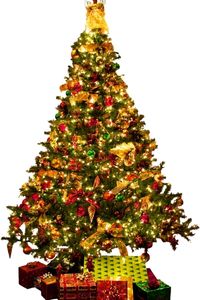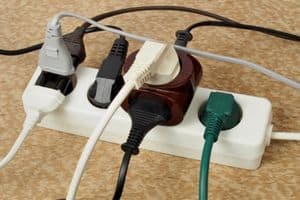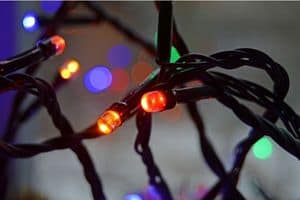You couldn’t imagine a holiday season that wasn’t bedazzled in glimmering, shiny, cheerful Christmas lights. You decorate both the inside and outside of your home with single-colored icicle lights, multicolored strand lights, and maybe a colorful selection of path lights. Are holiday lights a fire hazard?

Christmas lights are usually not a fire hazard, but they can be. If you daisy-chain extension cords for your outdoor light display or overload an indoor electrical socket, a fire can occur. Up to 770 Christmas light-related fires happen every year, notes the NFPA.
This article will answer your most burning questions about the fire risk of Christmas lights. By the time you’re done reading, you might plan your grand holiday light display a little differently for the coming year!
Table of Contents
Can Christmas Lights Cause a Fire?
The holidays are a time of togetherness, warm feelings, and celebration. They’re not a time to focus on fire risks, but you can’t let your guard down just because it’s the holidays.
If anything, with so many string lights adorning the inside and outside of your house, you want to be even more diligent.
According to a 2020 article from Jacksonville, Florida news resource News 4 Jax, the National Fire Protection Association or NFPA states that every year, 770 fires will occur due to Christmas lights. Here are the causes.
Daisy-Chaining Extension Cords
You’re about to hang your 10th strand of Christmas lights on your roof when you run out of extension cords. You can’t leave your home half-decorated like this, so you’re going to need another extension cord.
One extra extension cord turns into two and then turns into three or more.
Plugging an extension cord into another extension cord and then into another is known as daisy-chaining. You’re never supposed to do this, as extension cords aren’t designed for other extension cords.
You can cause one or all the extension cords to overheat. Before you know it, one of the extension cords is on fire, which spreads to the other cords quickly.
Overloading Extension Cords
The average extension cord may include a row of five or six outlet receptacles (the slots you plug your phone charger or table lamp into), but you’re not supposed to use them all. At most, you should use three.
Around the holidays, when you’re burning through more electricity than ever, it can be hard to abide by that rule. You might use all five or six receptacles at once or however many receptacles your extension cord has.

The power overload this can put on the extension cord strains it. The extension cord is very likely to catch alight.
Using Outdoor Lights Indoors or Vice-Versa
When you’re shopping for holiday lights, do you take the time to read the label? Some lights are rated for outdoor use and others for indoor use. You will never see Christmas lights that are rated for both.
If you use outdoor lights indoors, you could create a power strain. Outdoor lights are usually brighter and thus require more power, and your outlets won’t be able to handle it.
Affixing Lights Using Nails
The real struggle with Christmas lights is getting them to stay in place. Some people use plastic light clips, which are recommended. Others will staple the wire or use a nail to keep it in place.
Don’t do this. Both staples and nails can damage the wiring of the lights. You could get an electrical shock for your troubles, and the lights can cause a fire to boot.
Dry Christmas Trees
We hate to say it, but the biggest emblem of Christmas–the Christmas tree–is a fire hazard.
The tree, when still firmly rooted to the ground, is somewhat fire-retardant. Between cutting the tree and packaging it, it becomes very dry.
If you forget to water your tree for too long, or if the tree is out long after it should have been thrown away, it can ignite.
Is It Okay to Leave Christmas Lights on All Night?
It’s no secret that the cost of electricity usually goes up between November and January as your Christmas lights are on full display both inside your house and outside.
That’s why many homeowners use a light timer. The lights turn off by themselves, which reduces some of that financial burden.
Others might really like the glow of the holiday lights, so they want to keep them all on all night. Is prolonged use of Christmas lights a fire hazard?
Potentially, but more than likely not. If the lights aren’t near any flammable sources, then keeping them on for 12 hours or even 24 hours shouldn’t cause any fire risk.
That’s assuming of course that the lights are in good condition and aren’t being stapled or nailed to the wall or roof.
The bigger concern is that you’re wasting a lot of energy and thus electricity by keeping the lights on for that long. If you don’t mind this, then so be it, but a timer is always a good idea.
After all, why keep the Christmas lights on when you’re asleep and can’t appreciate their beauty anyway?
Do LED Christmas Lights Cause Fires?
LED Christmas lights are everywhere these days, and rightfully so! A strand of LED bulbs burns brighter and longer but without using as much energy compared to incandescent bulbs.

Plus, LEDs are known for producing less heat. This can lull homeowners into a false sense of security as they assume that there’s no way their LEDs could ever cause a fire.
Sadly, it’s not true. LED lights, just as any other type of Christmas light, can indeed lead to a fire per the reasons outlined earlier in this article.
Is It Safe to Hang Christmas Lights on Curtains?
As you deck the halls with boughs of holly and Christmas lights, you’ll undoubtedly come across some curtained windows. Perhaps these are in your living room or your bedroom or maybe even both.
How do you handle curtained windows? Can you hang the Christmas lights over the curtains like they’re not there? Could the string lights potentially warm up to a high enough degree that they cause the curtains to burn?
No, Christmas lights are not going to get hot enough to light your curtains on fire.
That said, the risk of the lights igniting increases when heat is trapped in. If you must put holiday lights near a curtain, then drape them over the curtain or on it, but not behind it.
Tips for Preventing Christmas Light Fires
You want your holidays to be merry and bright, not stressful and depressing. These tips for Christmas light fire safety will come in handy every year!
Don’t Leave Candles Burning in the Same Room with a Christmas Tree
A Christmas tree is always at least a mild fire hazard. That’s why you must keep the tree away from any flammable sources.
You can set a jolly mood and light a holiday-scented candle in the room with your Christmas tree, but don’t leave the candle unoccupied. In a moment, the flame can connect with your tree and fire can break out.
Avoid Covering Extension Cords
You have more extension cords around your home and yard than ever this time of the year. Although extension cords are quite unsightly, you don’t want to obscure them with a covering. Avoid putting anything on the extension cords.
Otherwise, you’re making the extension cord work harder. This will likely cause a fire.
Water Your Christmas Tree
This one seems like a no-brainer, but with so many social obligations on the calendar around the holidays, the tree can get forgotten about. The drier your tree is, the greater the fire risk. A hydrated tree is a safer one to keep in your home.
Don’t Let Your Tree Outstay Its Welcome
That said, no live Christmas tree lasts forever. Once December 25th has passed and certainly by New Year’s Day, your tree needs to be on the curb for trash collection.
The dry tree is a greater fire risk than ever before. It would not take much at all for it to go up in flames. Plus, cleaning up all those shed needles is a huge pain.
Replace Your Artificial Christmas Tree
Artificial trees, although they may be labeled as fire-resistant, can still catch on fire, especially if you’ve had yours for a while.
The fire resistance decreases as the fire retardant applied on the faux branches wears away year after year.
If you don’t even remember how old your artificial Christmas tree is, it’s a good idea to treat yourself to a new one this holiday season!
Christmas lights are indeed a fire hazard, especially when you daisy-chain electrical cords, overload extension cords, or keep a dry Christmas tree in the house.
You don’t have to spend the holidays in the dark but be conscientious about the risk of fire so you and your loved ones can stay safe!